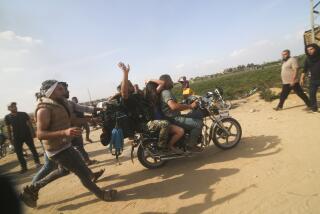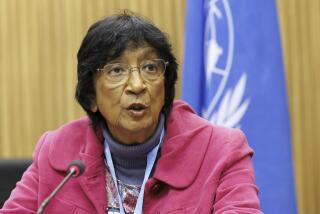U.N. Aide Cites ‘Serious’ Violations of Human Rights in Southern Iraq : Persian Gulf: Envoy tells of attacks against Shiite Muslim civilians, urges immediate dispatch of observers.
- Share via
WASHINGTON — A special U.N. envoy charged Thursday that the Iraqi government has committed “serious violations of human rights” against Shiite Muslim civilians in southern Iraq and called for dispatching U.N. observers there immediately to monitor the situation.
In a report labeled “urgent,” Max van der Stoel of the U.N. Commission on Human Rights told of military attacks on unarmed civilians, forced relocation of some Shiite families and a deliberate diversion of water resources to threaten the local population.
Van der Stoel said the 16-page report, the first of two parts on human rights violations in Iraq originally due out this autumn, was being issued early because he feared that the situation was deteriorating so rapidly that the damage may soon be “irreparable.”
He told the United Nations that there was no doubt, based on the evidence, that Iraq has violated U.N. Resolution 688--which prohibits repression of Iraqi citizens. And he warned that there is “considerable cause for concern” that Baghdad has adopted a specific policy aimed at controlling or destroying the Shiites.
Van der Stoel’s report was quickly cited by the Bush Administration to bolster its push for tougher enforcement of Resolution 688. Washington regards the issue as its best hope for winning global backing for new action against the regime of Iraqi President Saddam Hussein.
The State Department said Thursday that Iraq’s campaign against the Shiites--and its companion embargo against Kurdish forces in the north--amounted to “flagrant violations” of Resolution 688.
But top Administration officials backed away from a statement made to Congress on Wednesday by Edward Perkins, the U.S. ambassador to the United Nations, that Washington is preparing to ask the Security Council for new authority to use military power to enforce Resolution 688.
Pete Williams, the Pentagon spokesman, said Thursday that while the Administration “may choose to go back to the Security Council” for additional enforcement power, the United States believes that it already has adequate authority to launch military action if it wants.
In Baghdad, Hussein shuffled his Cabinet again after his latest confrontation with the United Nations over access to records. He replaced his finance minister and education minister and appointed a Shiite to be foreign minister.
The elevation of a Shiite Muslim to the foreign minister’s post comes as Hussein faces increasing pressure from abroad over his treatment of the Shiite minority. Analysts said the Iraqi leader frequently shuffles his Cabinet, partly to solidify his own power.
In Washington, six Iraqi opposition leaders who met Wednesday with Secretary of State James A. Baker III discounted the possibility--raised repeatedly by some U.S. analysts--that Hussein might be overthrown by a “palace coup” initiated by members of his own inner circle.
At a press briefing Thursday, the group’s members--including Shiite, Kurdish and Sunni Muslim opponents of the Baghdad regime--agreed that those surrounding Hussein are still too close to him to be likely to launch such an operation, and they warned that Western strategists are wasting their time thinking about it.
They continued to insist, however, that overthrowing Hussein is the only way the West can stop Iraq’s aggression against both its neighbors and its own citizens.
Sunni leader Salah Sheikhly said he is convinced that Washington is “very, very serious” about “tightening the noose” on Hussein and is likely to take steps soon.
Van der Stoel’s report was accompanied by a copy of a letter he wrote to Iraq’s foreign minister in which he said he had reliable information pointing to a “policy of aggression directed by government authorities against the population inhabiting the southern marshes.”
He also said he has acquired videotapes of raids and interrogations, including one in which Iraq’s prime minister personally ordered Iraqi army generals to “wipe out” three specific Shiite tribes. He said the tapes also show Iraqi soldiers training for those assaults.
The envoy’s report cited these developments:
* Iraqi forces have launched military attacks against dozens of Shiite villages in recent weeks, using heavy artillery, firebombs and strafing against the local populations. “Widespread deaths, arrests and disappearances” have been reported throughout the region.
* The Iraqi government has been ordering the forced relocation of Shiite villagers, similar to the operations it conducted against the country’s Kurdish population in the north in the late 1980s. Supplies of both food and medicine have been restricted.
* The government is speeding construction of the so-called Third River Project, which is diverting waters from the southern flats. Although the plan ostensibly is part of an irrigation project, the report said it is threatening the Shiites’ basic survival.
* There is evidence that Baghdad has embarked on a policy of extreme anti-Shiite propaganda. As one element, the ruling Baath Party newspaper, Al Thawra, has denounced the Arabs who live in the southern marshlands as inferior and “un-Iraqi.”
U.S. officials, amplifying Van der Stoel’s report, said Hussein’s forces are launching their attacks in the south without making any distinction between military deserters who sought shelter during last year’s war and tribes that have lived there for generations.
The Iraqi leader has seven divisions of the regular army and three brigades of Republican Guard troops deployed in the south.
The specialists said Thursday that the Shiites have the ability to “nibble away” at Iraqi security forces through low-level attacks but that they are still a long way from being able to spark any major uprising.
They said one reason for Hussein’s clampdown is his fear that failure to halt the unrest in the south would allow it to spread to Baghdad. “The south must be settled and under control for Hussein to survive,” one analyst said.
More to Read
Sign up for Essential California
The most important California stories and recommendations in your inbox every morning.
You may occasionally receive promotional content from the Los Angeles Times.













